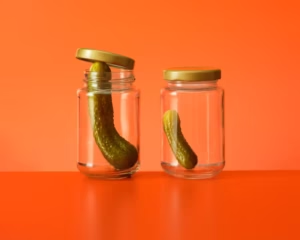
The Guardian: Bigger is always better – and nine other sex myths busted
Think only men suffer performance anxiety, your libido is set

Dr. Emily Jamea contributes to the discussion on the stress marriages are currently experiencing . This article was originally published on Healthy Women.
Like many married couples, Lisa Jean-Francois and her husband had settled into a routine before COVID-19. Days were spent juggling work and raising two kids, which included shuttling their seven-year-old son to school, tutoring and extracurricular activities.https://4495809d81de9347013a87bf286bb42f.safeframe.googlesyndication.com/safeframe/1-0-37/html/container.html
“My husband and I really didn’t spend that much time together because our lives have been devoted to maintaining our household,” Jean-Francois said. “Now that we’re both home, we’ve been forced to confront our communication challenges. This time in our lives is tense, and my seven-year-old has noticed the shift.”
Jean-Francois is far from alone, as lockdown and quarantine have forced many couples to be in constant contact in their homes.
I recently spoke with Saundra Jain, a psychotherapist and adjunct clinical affiliate for the School of Nursing at The University of Texas and member of the HealthyWomen Women’s Health Advisory Council. Given quarantining, working from home, homeschooling, financial issues, isolation and even fears about contracting the virus, Jain said it’s no surprise that many marriages are in crisis.
“All of these factors can cause long-standing issues to rise to the surface,” Jain said.
For some couples, COVID-19 has delivered the death blow to a relationship already on life support. Divorce rates in China rose in March, shortly after the country began recovering from the pandemic, and some family law experts predict a similar trend to emerge in the United States.
Divorce might feel like the only option for couples on the brink, but making that decision in the midst of an already stressful — and ever-changing — environment might not be the best solution.
“I always remind people to balance the emotional brain with the rational brain,” said Emily Jamea, a licensed marital and family therapist and a member of HealthyWomen’s Women’s Health Advisory Council. “Many couples are under a lot of stress right now, and while it may seem like a divorce is going to solve the problem or alleviate the pressure, oftentimes that’s not what happens. Couples should evaluate whether the stress and logistics of going through with the divorce will truly alleviate the tension they’re experiencing at home or just add to it.”https://4495809d81de9347013a87bf286bb42f.safeframe.googlesyndication.com/safeframe/1-0-37/html/container.html
Jamea encourages couples to address lingering issues that might have gone unaddressed before COVID-19. Couples should check in with each other at least weekly to talk about what’s working and what might need to be adjusted.
Focus on the positives of the relationship and consider renegotiating household roles and relationship boundaries, a process couples are usually pushed to explore when facing life transitions such as illness or a job loss, but in this case, the catalyst is a global pandemic.
Marital therapy can also help couples navigate pre- and post-pandemic conflict, such as communication challenges, loss of emotional and physical intimacy and a disconnect in partner expectations. The pandemic-fueled growth of telehealth allows couples to receive help in their own homes, and many therapists are offering evening and weekend hours since they too are working from home in many cases.
“Seeing a marital therapist and taking an honest look at the relationship is highly recommended,” Jain said. “Having someone to facilitate the conversation and maintain healthy communication in the face of extreme conflict is a smart way to approach rebuilding a relationship. It is also important that both of the partners are motivated to work on their relationship.”
If couples know they need to part, a separation could be an interim step to help minimize stress on both partners and their children.
“Ideally, people can try an in-home separation,” Jamea said. “You sleep in separate bedrooms and try to limit the interaction and conversation between the two of you. One partner takes the morning shift with the kids, for example, and the other takes the afternoon and evening shifts.”
She added that couples who need a geographic separation could perhaps get an inexpensive apartment. Rather than shuttling kids back and forth, the parents would take turns coming back into the home. (Of course, this option may be financially out of reach for many couples.)
Marriage and family therapy can also be helpful for couples planning to divorce. Counselors can help couples split up amicably, maintain good communication and co-parent effectively. Therapy can also help children adjust to the new changes in their family.
Some situations, however, are simply unsafe. Women who need to escape domestic violence can still access resources during COVID-19 to ensure their safety. If you don’t feel safe in your home, contact the National Domestic Violence Hotline, and look into local shelters if you can’t stay with family or friends. If you have an employee assistance program through your job, that program can also offer options.
“Ask for help — reach out to others,” Jain said. “Do your best not to isolate and hide what’s happening.”
A heated argument in front of their son — one he still brings up today — was the sign Jean-Francois needed to seek help.
“My husband and I both agree to never let that happen again,” she said. “We’ll be celebrating our ninth year of marriage this month, and we’ve decided that if we want to make it to our 10th anniversary, therapy is a must.”
Whether couples seek marital therapy or use other methods to address relationship issues during this pandemic, Jamea said they should take comfort in knowing that their situations aren’t unique.
“It helps to remember that we’re in this together,” Jamea said. “Recognizing that most couples are experiencing the effects of the pressure [of] this pandemic . . . can help take away that sense of aloneness. That can ease the pressure you may be putting on yourself, on your partner or on the relationship as a whole.”
Resources
National Domestic Violence Hotline: 1 800-799-7233

Think only men suffer performance anxiety, your libido is set

My client Cara couldn’t stop smiling as she settled into

Janeane, a new client, sat across from me in my